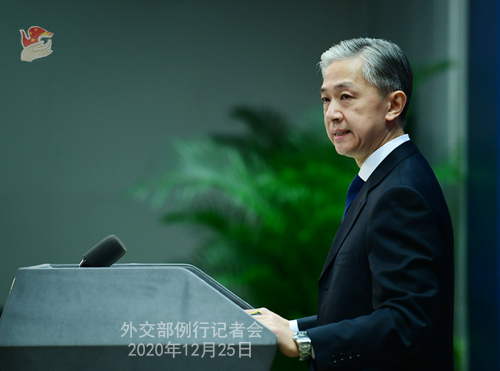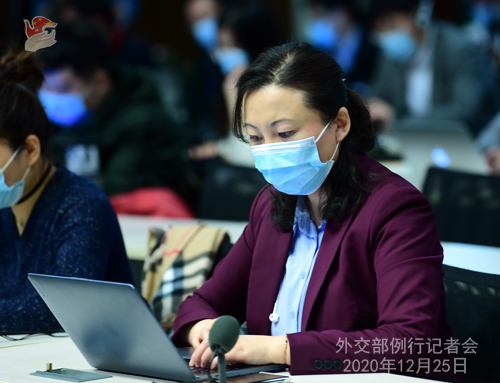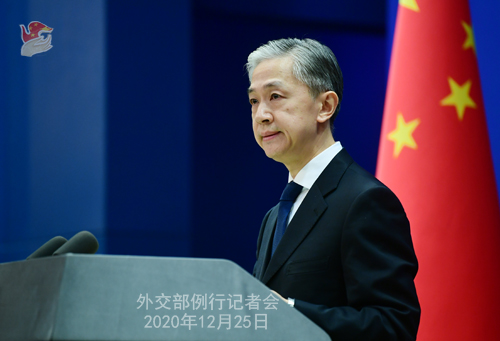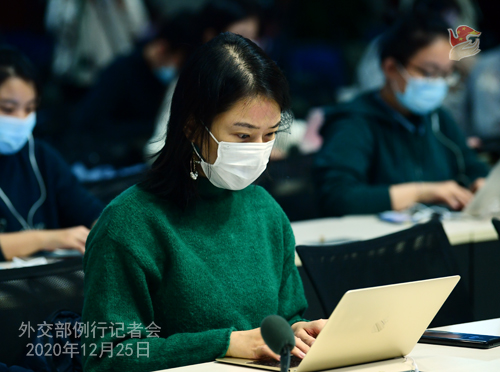| Foreign Ministry Spokesperson Wang Wenbin's Regular Press Conference on December 25, 2020 |
| 2020-12-25 20:10 |
|
CCTV: As the year 2020 is drawing to a close, how does China comment on its relations with Arab countries throughout the year? What is your outlook for the development of China-Arab relations next year? Wang Wenbin: With major changes and a global pandemic unseen in a century, the year 2020 is fraught with uncertainties. Responding to these uncertainties with distinct stability, China-Arab relations have continued to grow, becoming a model of state-to-state relations and a paradigm of South-South cooperation. President Xi Jinping has held nearly 10 phone calls and exchanged nearly 20 letters with Arab heads of state, providing strategic guidance for the development of China-Arab relations. In the face of the unexpected epidemic, China and Arab countries have stood together and worked hand in hand to provide each other with supplies, share experience and cooperate on vaccine research and application. On issues bearing on core interests and major concerns, the two sides have given each other firm and strong support and jointly safeguarded multilateralism and international equity and justice. Despite the severe impact of the pandemic and the overall downturn in the global economy, China-Arab cooperation for mutual benefit and win-win progress has been steadily advanced, and the Belt & Road cooperation has continued to make progress. In the first half of 2020, the overall trade volume between China and Arab countries reached 115 billion US dollars, making China a steady top trading partner of Arab countries. China imported 130 million tonnes of crude oil from Arab countries, which accounts for half of China's total crude oil imports over the same period. China and Arab states have advanced resumption of work and production, cooperation in the media sector, as well as reform and development in a progressive manner. Besides, the two sides have held in-depth exchange of experience in state governance and constantly enriched China-Arab relations. At the ninth ministerial meeting of the China-Arab States Cooperation Forum held in July 2020, the two sides agreed to hold a China-Arab summit, announced the decision to jointly build a China-Arab community with a shared future for a new era, and identified a road map to realize this vision, injecting strong impetus into the future-oriented China-Arab strategic partnership featuring comprehensive cooperation and common development. Looking ahead to the year 2021, China is ready to work with the Arab side to strengthen high-level exchanges, steadily advance resumption of work and production and jointly pursue Belt & Road cooperation. We will launch more livelihood projects, strengthen the foundation for China-Arab friendship, strive to build a China-Arab community with a shared future, and make greater contribution to the building of a community with a shared future for mankind. Reuters: Japan's deputy defense minister Yasuhide Nakayama told Reuters in an interview that he urged US President-elect Biden to clarify his position and policy on Taiwan. He also expressed worries that China would be more aggressive towards Taiwan. What's your comment? Wang Wenbin: The Taiwan question is China's internal affair. We are firmly against any country and anyone interfering in China's domestic affairs in any way.
Kyodo News: The Indian foreign ministry said yesterday that two Indian freights arrived near ports in Hebei in June and September respectively, but China hasn't allowed them to harbor in the port and go through clearance citing pandemic regulations. However, ships that arrived after them already went through customs clearance and left the ports. It is said that the two Indian ships have Australian coal on board. I wonder if you are aware of the situation? Does it have something to do with China-Australia and China-India relations? Wang Wenbin: As we said repeatedly, China has clear regulations on port epidemic prevention and control as well as quarantine of crew members. The Chinese authorities have been in close communication with the Indian side, responding to its demands in a timely manner, and providing essential convenience and assistance as allowed by the epidemic regulations. I would like to add that as far as I know, some Chinese ports now allow crew change as long as the epidemic regulations permit, but Jingtang Port and Caofeidian Port are not among them. It is the shipping party's independent choice whether to adjust its operation plan. You may ask the competent authorities or the local government about the specifics. You asked whether this has something to do with China-Australia and China-India relations. I don't see any links there. China Daily: Lately a handful of politicians have been alleging that China's cooperation with Pacific island countries damages the latter's interests and poses security threats. What's your comment? Wang Wenbin: The allegation is pure slander and has no audience in Pacific island countries. I would like to take this occasion to tell you what is really happening between China and Pacific island countries. China and the Pacific island countries are comprehensive strategic partners. Our relations have sustained a momentum of rapid development in 2020 despite the impact of the COVID-19 pandemic. Our political mutual trust has been deepened in our joint fight against the pandemic; our foundation of cooperation strengthened by overcoming difficulties together; our common interests expanded amid unprecedented changes; and our friendship consolidated through mutual assistance. When China was in the depth of its fight against COVID-19, the governments and people from all walks of life in Pacific island countries offered their strong support. The Chinese side returned the favor by setting up the "China-Pacific Island Countries Anti-COVID-19 Cooperation Fund" and providing many batches of epidemic prevention supplies to the island countries, which played an important role in their responses against COVID-19. Together we overcame various difficulties like traffic interruptions to resume work and production and to ensure steady progress of BRI projects such as the PNG Western Highlands Road and the Pacific Games Stadium in Solomon Islands. Under the G20 debt service suspension initiative, China has signed debt relief agreements with eligible island countries. In the face of rising unilateralism and bullying practices, China and the Pacific island countries have upheld multilateralism, maintained close communication and coordination on issues such as pandemic response, human rights and climate action, and injected positive energy into promoting international fairness and justice and building a community with a shared future for mankind. Going forward, China is ready to work with the Pacific island countries to promote the sustained and stable development of our comprehensive strategic partnership and deliver more benefits to our peoples.
AFP: First question, MOFCOM yesterday released a statement saying that China will hold negotiations at its own pace. Does this mean that the China-EU investment deal will not be completed by the end of this year? Secondly, various countries have called on China to allow the 12 Hong Kongers detained in Shenzhen to face legal proceedings in Hong Kong. Some families received notice today from lawyers that the hearing will be on Monday. Can you confirm this and offer more details? Wang Wenbin: On your first question, I refer you to the response by the spokesperson of the Ministry of Commerce yesterday. I would like to stress that the China-EU investment agreement aims to provide more opportunities and sound institutional guarantee for bilateral investment. In order to reach the deal, the two sides need to work together in the same direction. China is committed to advancing high-level opening up. On the premise of safeguarding our security and development interests, we will pursue negotiations with other sides at our own pace. We will strive to conclude a comprehensive, balanced and high-level investment agreement with the EU. As to your second question, it's not a diplomatic issue. We are against inference by any country in our domestic affairs. Phoenix TV: According to media reports, the U.S. government said in a joint report submitted to Congress that Chinese fishing ships engage in massive IUU fishing all over the world and that "forced labor" is a serious issue in its fishing industry. Do you have a response? Wang Wenbin: As a responsible fishing country, China attaches great importance to science-based conservation and sustainable use of fishery resources and actively fulfills its international obligations. China has established a full-fledged management system for distant-water fishing and implemented the world's most rigorous Vessel Monitoring System (VMS). We exercise voluntary fishing moratorium on the high seas in Southeast Pacific and Southwest Atlantic. China has joined eight regional fishery management organizations, with high-ranking performance in compliance. At the same time, China works actively with the international community to crack down upon illegal, unreported and unregulated fishing. In 2021, we will also adopt a reporting and observer system for transshipment on the high seas to help conserve fishing resources. As per international customary practice in the distant-water fishing industry, Chinese businesses came into mutually-beneficial labor cooperation relations with some countries on their own accord. There is no "forced labor". Authorities in China and relevant countries also maintain good communication regarding the establishment of bilateral fishing labor cooperation mechanisms. We reject baseless and malicious attacks and slanders. I would also like to point out that U.S. seiners far exceeded the number of days they are allowed to fish on the high seas according to relevant fishing management organization, and they have been doing this for many years. This has been a cause for concern among other members at the organization. Shouldn't the United States reflect upon its behavior and stop violating the rules?
|
| |||||||||||||||
|
|||||||||||||||





